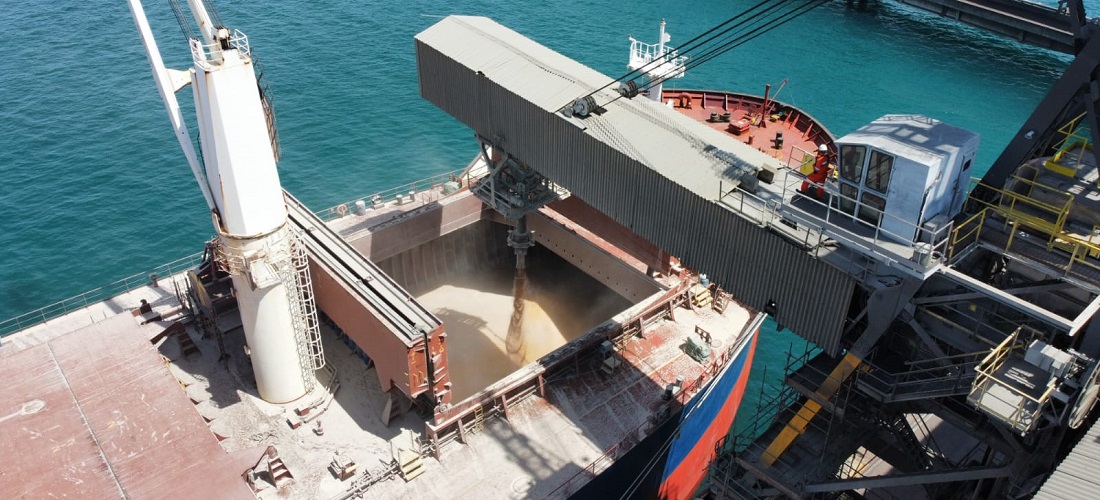
Drought Alters Grain Logistics in Northern Brazil, Shifting Cargo to Southeast Ports
Oct, 30, 2023 Posted by Gabriel MalheirosWeek 202341
The drought in the northern region of Brazil has caused a significant change in the logistics of grain transport to the region’s ports. With some rivers in the Amazon Basin at their lowest levels in recorded history, many buyers are opting to ship their goods to ports in the Southeast.
“The cost of transporting grains to ‘Arco Norte’ [Northern Arc] ports has increased because, whereas barges previously did it, carriers now have to rely on trucks, doubling the cost of the operation. That’s why many cargoes are migrating, primarily to the port of Santos,” stated Francisco Queiroz, an analyst at the Itaú BBA Agro Consultancy.
In a report analyzing the impact of extreme weather on grain exports across Northern Arc ports, the institution noted that the situation worsened this year. This is due to the seasonal low water levels in the Amazon Basin, exacerbated by the effects of El Niño and warming in the North Tropical Atlantic.
In addition to the impact on transport, the lack of rain in the North can also lead to a decrease in export premiums for corn, according to the specialist.
The chart below displays corn exports from the Arco Norte ports mentioned above between Jan 2019 and Aug 2023. The data is from DataLiner.
Corn exports – Arco Norte | Jan 2019 – Aug 2023 | WTMT
Source: DataLiner (click here to request a demo)
With the difficulty of shipping goods to the country’s north, demand for freight has decreased, as have prices, according to Fernando Bastiani, an Esalq-Log researcher. Rates from Sorriso (MT) to Itaituba (PA) fell from R$302.98 per ton in September to R$276.64 this month.
Export Record
Despite this new dynamic in corn logistics, Itaú BBA’s Queiroz does not believe Brazil will face difficulties shipping the 55 million tons projected by the US Department of Agriculture (USDA) for this cycle.
He believes that sales will continue as usual, despite the fact that the waiting time for shipment from the port of Santos has increased from nine days at the beginning of the month to 16 now.
“In the year-to-date until September, Brazil has already exported 28 million tons, and another 9 million are expected to be shipped this month. Exports will test the operational capacity of the Santos port, but the product will not stop flowing, so I believe in record volumes,” projected the analyst.
According to Flávio Acatauassú, CEO of the Association of Port Terminals and Cargo Transshipment Stations in the Amazon Basin (Amport), grains transported via the Madeira or Tapajós rivers continue to reach the Northern Arc ports without major disruptions.
With the drop in the river’s depth, barges had to carry 50% less weight along the Madeira River and 40% less on the Tapajós. But in recent days, both rivers have risen by 70 centimeters.
“Companies that planned ahead are entering and leaving the ports. Now, those who didn’t measure the river’s depth or tried to pass larger ships couldn’t,” said Acatauassú.
In the report, Itaú BBA also highlighted that rainfall in northern Brazil is expected to remain below average until January 2024.
-
Meat
Aug, 10, 2022
0
South Africa stops charging anti-dumping tariffs on Brazilian chicken
-
Meat
Jan, 27, 2022
0
Beef: Argentina sets US export quota
-
Ports and Terminals
Aug, 12, 2021
0
Port handling grows in Santa Catarina, setting new record
-
Shipping
Feb, 24, 2022
0
Ships Sit Empty for Weeks Waiting for Delayed Brazil Soybeans


